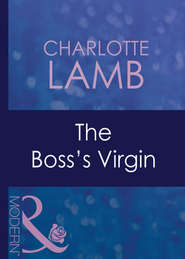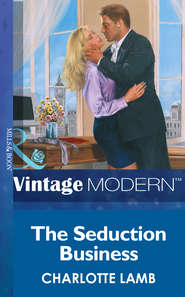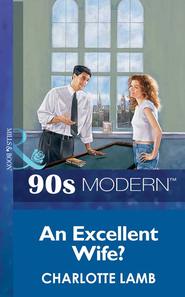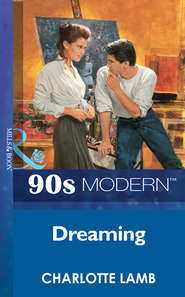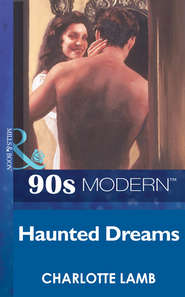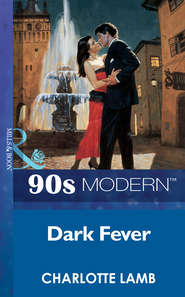По всем вопросам обращайтесь на: info@litportal.ru
(©) 2003-2025.
✖
Vampire Lover
Автор
Год написания книги
2018
Настройки чтения
Размер шрифта
Высота строк
Поля
Clare felt Denzil Black’s dark gaze in the driving mirror, but didn’t meet it. She sorted out the large front-door key, slid out of the car, and climbed the steps to the door. This lock turned easily enough, the door swung open with a prolonged creak, and Clare fumbled for the light switch just inside on the panelled walls of the hall.
Light blazed from a chandelier hung high above their heads. Ahead of them stretched the arched vault of the roof, and the panelled walls, hung with an extraordinary mixture of objects—paintings, sketches, prints, armour, photographs in silver frames, weapons, the heads of dead animals mounted on wooden plaques.
The wind blew through the long hallway; a door crashed shut somewhere up above; stained-glass windows further down the hall rattled.
‘It’s monstrous!’ Helen wailed, huddling into her coat, her pale face only just visible above the collar. ‘You can’t be serious about being interested in this place, Denzil! It’s a tomb, not a house.’
It was cold, Clare had to admit, and not simply because it was empty and this was autumn. The house had a deep coldness which was in the very bricks and stones of the building. She had a feeling it would never be warm, even if you lit a fire in every room.
‘Central heating will soon warm it up,’ Denzil Black said, opening the first door leading off the hall. ‘That shouldn’t be difficult to install.’
Clare could see his face now, clearly, for the first time; an austere bone-structure, a wide, passionate mouth, strong nose, those pale eyes with the glittering centres, his black hair growing from a widow’s peak on his high temples. Each feature contradicted all the others; it was not an easy face to read or assess.
‘I like big rooms,’ he said, looking around the main reception room.
‘This is certainly big,’ agreed Clare.
‘Big! It’s enormous!’ groaned Helen.
On two sides of the room windows ran from ceiling to floor, those in the turret bay having deep, cushioned window-seats. All the rooms in the house had high ceilings; from this one another chandelier hung, giving the room a party glitter. There was a wooden fireplace like the prow of a ship, the hearth dressed with Victorian Minton tiles which bore black-line medieval style pictures on their ochre background.
The furniture was old and shabby, the stuffing leaking out of Victorian chairs, the curtains threadbare, the carpets showing signs of wear and tear.
On every possible surface stood silver-framed photographs and ornaments; the walls in here were as lined with paintings and drawings as the hall had been. There were so many objects, in fact, that the effect was mind-numbing; you looked and looked until you could take in no more.
‘Wonderful,’ Denzil Black said.
‘It’s only fit for the garbage truck!’ Helen complained.
Denzil Black asked, ‘Are the entire contents for sale, did you say? If I buy, I’d want first pick of everything in the place.’
‘I’m sure that could be arranged.’ Clare would be relieved if they managed to sell a tenth of the stuff. There were a few antiques of value, but most of the furnishings were in bad repair and would sell for peanuts at auction. Clare often acted as auctioneer at sales; her father mostly did them, but when they were dealing with a large number of objects it took hours, and Dad found it tiring after a while, so Clare usually took over to finish the auction. She had learnt to price objects at sight, and had a very good idea how much money would be raised by the sale of the contents of Dark Tarn.
‘Oh, Denzil, surely you can’t be serious?’ Helen moaned, following him as he strode on down the hall to the next room, a few curled brown leaves blowing along with him from the open front door.
Clare paused to close it, before following the other two. She found them in the gloomy servants’ hall; a long, narrow room with tiny windows, a lot of dull brown paint, and walls which had once been cream-coloured, on one of which hung a row of bells labelled with the names of other rooms. From the ceiling hung ancient hooks, from which hams and herbs had once hung, and a broken laundry pulley, which had been used to suspend washing high above the heads of the servants as they sat around the long, well-scrubbed deal table.
‘It’s so dreary!’ Helen said, staring around the room with unhidden distaste.
‘All it needs is a coat of varnish, a pretty wallpaper, some white paint—it will look wonderful! This dresser must be the same age as the house,’ Denzil said, running a finger along the dust piled up on the shelves which held rows of plates and bowls and jugs.
‘It is,’ agreed Clare. ‘Some of the china is quite good, too. A lot of it’s Victorian, and it will fetch excellent prices at auction.’
‘I may well want to keep it all,’ he said.
‘Oh, my God!’ Helen groaned. ‘It would be like living in a museum!’
Eerily, on the flat top of the dresser, stood a bowl of long-dead flowers, their skeletal shape dusty and dry, wreathed in cobwebs, among which was the mummified body of a spider.
Helen stared at it, dramatically shuddered, wrapped her coat around herself, and gave Denzil Black a reproachful stare. ‘It’s like the Mary Celeste in here! I keep expecting the owners to come back from the dead. I can’t take any more—I’m going back to the car. Hurry up before I freeze to death!’
She stamped out, her high heels clattering along the tiled floor of the hall. The front door creaked open, slammed shut with a booming, echoing sound.
‘I’m afraid she doesn’t like the house,’ murmured Clare.
‘Well, she won’t be living in it,’ Denzil Black drawled, and Clare’s blue eyes flickered thoughtfully.
Oh, wouldn’t she? Well, bang went one theory. Obviously he had not brought Helen here to see her future home! Did she realise that?
Clare didn’t think she did. Helen had been showing an almost proprietorial attitude towards him; Clare was convinced their relationship was not purely professional.
She met Denzil Black’s glossy-pupilled eyes and saw sardonic amusement in them. He had been watching her, reading her thoughts. A faint pink crept under her skin.
‘I wanted her to advise me on the property value,’ he said.
At once, Clare told him, ‘I think the house is a bargain, considering its size and the very large amount of land that goes with it.’
He gave her a dry look. ‘Well, you would say that, wouldn’t you? I was hoping Helen would give me a neutral point of view. Shall we go upstairs and see the rest of the place?’
The house seemed even bigger upstairs, and emptier, too. Every movement they made echoed, their footsteps on floorboards creaked. It was freezingly cold, too.
Clare would have liked to follow Helen out of here, but she kept reminding herself of the percentage the firm would get from this sale, so she followed Denzil Black around from one bedroom to another, forcing herself to make bright, encouraging comments.
He must be mad even to consider buying it, she thought, staring at the four-poster bed hung with ancient, tattered dark red curtains, which dominated the main bedroom. The oak shutters were closed across the high windows, there was only one faint lamp beside the bed, and the light reflected in a narrow Gothic-arched oak-framed mirror hanging on the opposite wall. That would probably sell well at auction. It was small enough for modern houses, and perfectly in tune with the current taste for art nouveau.
As she stared at it, Denzil Black looked round and followed her gaze.
‘That’s charming,’ he said at once. ‘I’ll certainly want to keep that.’
He had very good taste. Curiously, she asked him, ‘What do you actually do, Mr Black? What’s your job?’
‘At the moment I don’t have one.’ He shook a curtain, watched the dust fly up from it. ‘But don’t worry, I’ll be paying cash for Dark Tarn, if I buy it. There’ll be no problem about money.’
That was not what she was thinking about. Her curiosity about him still unsatisfied, she asked, ‘Where do you live at present? I mean, apart from staying at Jimmy Storr’s hotel?’
He gave her a dry, sardonic look. ‘Los Angeles.’
Her eyes widened. She hadn’t expected that. ‘Really? But you’re not American, are you?’ He had a faint accent of some kind, admittedly, but she hadn’t pinned it down as American.
‘No. I was born in Scotland, not that I remember anything about it. I left there when I was two years old. I lived in Manchester until I was twenty-one, but I spent a succession of very good holidays in Greenhowe in my late teens.’
‘Oh, that’s why you’ve come back?’
He looked amused. ‘That’s what you wanted to know, was it? Why I wanted to move to Greenhowe? Well, in answer to your next question, I’ve lived in California for years now, mostly around Los Angeles and Beverley Hills.’
‘Beverley Hills?’ She stared at him, couldn’t keep back the question, ‘You aren’t in the film business?’ She laughed as she asked, expecting him to shake his head.
‘Yes,’ he said, though, calmly.






